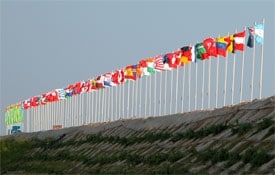
Olympic0813
ATHENS–The 2004 Olympic sailing competition is scheduled to start Saturday at 1 p.m., local time, with the Men’s 470 and Finn classes crossing the line. Five minutes later, weather permitting, of course, the Women’s 470 and Yngling groups will follow suit. Today, though, is a quiet one around the expansive Agios Kosmas Olympic Sailing Center in Glyfada, a suburb approximately 10 miles from downtown Athens. The opening ceremonies are this evening and the feeling around the regatta site is one of, “OK, we’re done preparing for this event, let’s get this show on the road.” Of the four classes getting underway tomorrow, the Men’s 470 division is where the United States has the best chance of a medal. Paul Foerster and Kevin Burnham have three silver medals and five Olympic regattas between them, and they’ve been as consistent as anyone on the U.S. team in international competition. “I think [our chances] are excellent,” says the 47-year-old Burnham, the oldest competitor on the U.S. Olympic sailing team. “But the class is so deep in talent, I’d say that there are 10 to 15 boats that can win a gold.” The 28-boat Men’s 470 fleet held its practice race on Thursday. Foerster and Burnham picked the wrong side of the course on the first upwind beat, going right as the breeze went left, but then turned on the jets. “We rounded second or third to last at the weather mark,” he says. “We just closed in, on the leeward leg, with the whole pack and then we picked off boats up the next beat and went the right way. We’re going good. Most people peeled off [before the finish], but we were in fifth place so we passed 20 boats.” Thursday’s wind was from an onshore seabreeze that steadily increased throughout the day. That breeze is also blowing today and predicted for the first day of racing. Though the seabreeze is prone to 30-degree shifts, according to Burnham, it’s a much more predictable wind pattern than the offshore Meltemi, which is expected to show up on Sunday. “When it comes out of that Meltemi direction, it’s like, ugh, say your prayers,” says Burnham. “Rarely do you see in that Meltemi where the first boat around the first mark ends up wins the race. The wind drops in, guys will be trapezing and you’ll be sitting in the boat. It’ll be so close to you, but you can’t get to it. It’s incredible. You can keep your eyes peeled and the wind just drops in, it doesn’t come across the water. Just practicing, we got auto-tacked; we never saw wind on the water. All of the sudden the jib backwinded and I had to peel of the wire or I would’ve flipped the boat over. I swam around the bow, climbed on and sheeted in on the other side.” When asked about the other favorites in this class, Burnham quickly rattled off a number of countries, including Great Britain, Sweden, Greece, the Ukraine, Portugal and Italy. He then dropped a few more in moments later, adding that he feels it’s the most competitive class at the 2004 Olympics. In the two women’s classes starting tomorrow, both U.S. teams have good reason to like their chances on the Saronic Gulf. For Katie McDowell and Isabelle Kinsolving, the U.S. 470 team, their confidence stems from a third place the European championships in June, the last major regatta before the Games, an intimate knowledge of their boat and their sails, and, to a lesser extent, a victory in Thursday’s practice race, where they eschewed tradition and crossed the finish line. “I remember talking to [1996 U.S. Olympic 470 skipper] Kris Farrar,” says McDowell, 28, “and she said that one of the best things you can do for yourself is know your equipment.” Many sailors spend the last few months before the games testing the latest and greatest sail designs and equipment. But McDowell and Kinsolving will be sailing with a spinnaker design they’ve used since February and a main they picked in March. The jib cut has remained unchanged since the Europeans. The Yngling team of Carol Cronin, Liz Merrifield Filter, and Nancy Haberland has history on their side, as the U.S. usually does well in keelboat events and in first-time Olympic events. The 22-foot Yngling is both. The trio of first-time Olympians also emerged from what was the strongest country trials in the class. Also sailing in his first Olympic race tomorrow will be Finn sailor Kevin Hall, a veteran of four U.S. Olympic Trials in three difference classes. Hall’s struggles to get the necessary medical exemption to compete in the Olympics–he lost both testicles to cancer and must take regular injections of testosterone–have received a lot of attention of late. He is an outside medal hope, at best, having only started his campaign in the spring of 2003. But, says teammate Mark Mendelblatt, who’ll start his Laser regatta on Sunday, don’t discount his ability. “I’d put his talents up against any of those guys in the Finn class,” he says. “It’s just a matter of whether he can get himself going fast in the boat in such a short period of time.” Hall finished second in the voting, done by the team captains from each sport, that decided who would carry the U.S. flag in tonight’s opening ceremonies. He’ll walk in a position of honor at the front of the U.S. contingent. Charlie Ogletree, who will be competing in his third Olympics in the Tornado, was selected as the U.S. team captain. Basketball player Dawn Staley will carry the U.S. flag. All four classes which race on Saturday will also sail on Sunday, when they’ll be joined by the Europe, Laser, and Men’s and Women’s Mistral classes.









